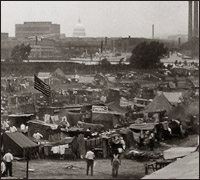 |
| Walter Waters helped lead the Bonus Army as its members expanded from camps in a row of condemned buildings in downtown Washington into a well-organized, well-run shantytown (top) just across the Anacostia River from Capitol Hill. They used the camps as a base for a series of peaceful, patriotic demonstrations below demanding their promised payments. (National Archives) |
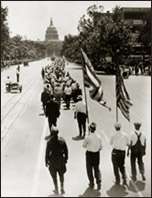 |
Army Chief of Staff and Major General Douglas MacArthur watched a brigade of steel-helmeted soldiers precisely align themselves in a straight four-column phalanx, bayonets affixed to rifles. He nodded his head in satisfaction. Discipline was wonderful. Up ahead, Major George Patton kicked his heels against his mount, and the big horse reared forward to signal a line of cavalry. The riders drew their sabers, and the animals stepped out in unison, hoofs smacking loudly on the street. Five Renault tanks lurched behind. Seven-ton relics from World War I and presumably just for show, the old machines nonetheless left little doubt as to the seriousness of the moment. On cue, at about 4:30 p.m. on July 28, 1932, the infantry began a slow, steady march forward. Completing the surreal atmosphere, a machine gun unit unlimbered, and its crew busily set up.
This was no parade, although hundreds of curious office workers had interrupted their daily routines to crowd the sidewalk or hang out of windows along Pennsylvania Avenue between the White House and the Capitol to see what would happen. Up ahead, a group of weary civilians, many dressed in rags and ill-fitting, faded uniforms, waited in anticipation amid their sorry camp of tents and structures made from clapboard and sheets of tin covered in tar paper. Some loitered in the street. They had heard something was afoot — expected it after what happened earlier. Now, a murmur rose from the camp crowd. Upon seeing the Army’s menacing approach, they were momentarily stunned, disbelieving.
Recovering their senses, a few of the men cursed and sent bottles and bricks flying toward the troops — ineffective weapons against so formidable a force. The missiles shattered on impact on the hard pavement or bounced off the flanks of horses and soldiers. Undaunted, the roughly 600 troops maintained their discipline with tight-lipped determination. The extra training MacArthur had recently ordered was paying off.
Some of the camp inhabitants had already begun running from the oncoming soldiery, but angry packs held their ground, defiantly wielding clubs and iron bars, yelling profanities. An officer signaled, and the infantry halted to don masks and toss gas grenades. Forming into two assault waves, they continued their push. Clouds of stinging, gray fumes wafted through the air, forcing most of the remaining unarmed veterans to flee in panic. One particularly pesky truckload continued to throw debris, prompting a quick response from Patton: ‘Two of us charged at a gallop and [striking with the flat of our swords] had some nice work at close range with the occupants of the truck, most of whom could not sit down for some days.’
As cavalry dispersed a group of outnumbered veterans waving a U.S. flag, a shocked bystander, his face streaked with tears from the gas, accosted MacArthur as he rode along in a staff car. ‘The American flag means nothing to me after this,’ the man yelled. The general quieted him with a stern rebuke, ‘Put that man under arrest if he opens his mouth again.’ The energetic officer was in his element. One reporter observed, ‘General MacArthur, his chest glittering with medals, strode up and down Pennsylvania Avenue, flipping a riding crop against his neatly pressed breeches.’
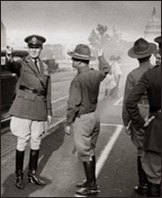 |
| Following what the D.C. police commissioners had labeled a’serious riot’ by the Bonus Army, a beribboned Maj. Gen. Douglas MacArthur was charged with using U.S. troops, aided by machine gun–laden trucks, to clear the demonstrators from the center of the city. (National Archives) |
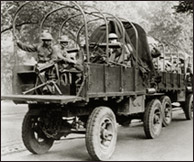 |
MacArthur could not help being euphoric. If the tactics were not textbook, the results were everything he hoped for — a complete rout. The troops had exercised perfect restraint in completely clearing the downtown area without firing a shot. Within hours it was all over. Troopers set the abandoned camp ablaze as the former inhabitants retreated, demoralized and beaten, across the Third Street bridge. MacArthur called a halt to allow his troops to rest and eat while he considered his next move.
As many as 20,000 former soldiers and their families had converged on Washington in the summer of 1932, the height of the Great Depression, to support Texas Congressman Wright Patman’s bill to advance the bonus payment promised to World War I veterans. Congress had authorized the plan in 1924, intending to compensate the veterans for wages lost while serving in the military during the war. But payment was to be deferred until 1945. Just one year earlier, in 1931, Congress overrode a presidential veto on a bill to provide, as loans, half the amount due to the men. When the nation’s economy worsened, the half-bonus loans were not enough, and the unemployed veterans now sought the balance in cash. Known as Bonus Marchers, they came in desperation from all across the nation, hopping freight trains, driving dilapidated jalopies or hitchhiking, intent on pressuring Congress to pass the legislation. The administration vehemently opposed the measure, believing it inflationary and impractical given the $2 billion annual budget deficit.
At first the march was a trickle, led by Walter Waters, a 34-year-old former sergeant from Portland, Ore. It soon became a tidal wave, drawing national press attention. The first contingent reached the nation’s capital in May 1932. They occupied parks and a row of condemned buildings along Pennsylvania Avenue, between the White House and the Capitol. When new arrivals overflowed that site, they erected a shantytown on the flood plain of the Anacostia River, southeast of Capitol Hill. Theirs was a miserable lot, alleviated somewhat by the beneficence of the city’s superintendent of police, Pelham Glassford, himself a war veteran.
Glassford pitied the beleaguered itinerants and solicited private aid to secure medical assistance, clothing, food and supplies. During a May 26 veterans meeting, Glassford suggested they officially call themselves the Bonus Expeditionary Force. Adopting the name — which was commonly shortened to Bonus Army — they asked him, and he agreed, to serve as secretary-treasurer of the group. Working together, Waters and Glassford managed to maintain enough discipline and order in the ranks to ward off eviction. Glassford likely hoped that the horde would eventually lose interest and return home, but Waters had other ideas. ‘We’ll stay here until the bonus bill is passed,’ Waters told anyone who would listen, ’till 1945, if necessary.’ He staged daily demonstrations before the Capitol and led peaceful marches past the White House. President Herbert Hoover refused to give him an audience.
In June the House of Representatives narrowly passed the Patman bill, but the Senate defeated the measure with a lopsided vote of 62 to 18. Congress was scheduled to adjourn in mid-July, and about one-quarter of the veterans accepted the government’s offer of free transportation home. Hoover had apparently won. Perhaps now he could concentrate on an economic recovery plan and the upcoming reelection campaign. But many of the marchers felt betrayed and disillusioned. With nowhere else to go, they decided to stay. Ominously, their disappointment festered in Washington’s muggy summer heat. To complicate matters, at this point the American Communist Party saw an opportunity to cause trouble, and sent forth John Pace as the catalyst with instructions to incite riot. The degree of his success is uncertain and will be forever a matter of debate, but his presence alarmed the Washington power structure.
Historian Kenneth S. Davis theorizes that Pace may have had a hand in escalating the tensions, goading the angry veterans to become more aggressive. A more plausible explanation for rising tension may simply be that frustrations finally reached a boiling point. In any case, Secretary of War Patrick Hurley had had enough. On July 28 he ordered Glassford to immediately evacuate the occupied buildings, which were scheduled for demolition to make way for new government offices. The veterans stubbornly refused to budge. For whatever reason, Glassford and his police officers became the target of bricks and stones, and one officer suffered a fractured skull. As the melee got out of hand, an angry veteran, apparently feeling that Glassford had betrayed the Bonus Marchers, tore off the chief’s gold police badge. Fearing for their safety, police opened fire, killing one veteran and mortally wounding another.
The officers retreated while Glassford sought the advice of his Board of Commissioners. Quick to pass on the responsibility, and perhaps overreacting, the commissioners called the president to deploy the Army from nearby Fort Myer to restore order. Describing the attack on police as a’serious riot,’ the commissioners asserted, ‘It will be impossible for the Police Department to maintain law and order except by the free use of firearms.’ They went on to argue that only the presence of federal troops could resolve the crisis.
Hoover, upset by the continued presence of the Bonus Marchers, now had the excuse he was looking for to expel them from the capital. He directed Secretary Hurley to unleash MacArthur, who received the following instruction: ‘You will have United States troops proceed immediately to the scene of the disorder. Surround the affected area and clear it without delay. Any women and children should be accorded every consideration and kindness. Use all humanity consistent with the execution of this order.’
Not surprisingly, MacArthur now executed his orders in a manner seemingly designed to maximize media attention. In a highly unusual but characteristic decision — one purportedly against the advice of his aide, 42-year-old Major Dwight Eisenhower — he chose to oversee the operations in the field with the troops. Military protocol called for a commanding officer to remain at headquarters. This was especially true for MacArthur, whose post was administrative rather than operational. So while he charged General Perry Miles with carrying out the eviction, MacArthur assumed the real responsibility. Although no other situation offers an exact comparison, MacArthur’s action was as if General Maxwell Taylor, the head of the Joint Chiefs of Staff in 1963, had led National Guard troops to the University of Alabama to confront Alabama Governor George Wallace.
Having driven the veterans from the downtown area, MacArthur had fulfilled his mission. But whether his blood was up, or he merely sensed a need to inflict a coup de grâce against the purported Communist element — an enemy he considered more insidious than disgruntled veterans — MacArthur did not rest on his laurels. He ordered his troops to advance upon the 11th Street bridge leading to Anacostia Flats. Someone, waving a white shirt as a flag of truce, came racing across to plea for time to evacuate the women and children. MacArthur granted an hour’s reprieve.
Though accounts differ, the president now seemed suddenly to exhibit an untimely case of nerves. Fearing repercussions, he twice sent word that the Army was not to cross the bridge. MacArthur refused to listen, saying he hadn’t time to be bothered by people coming down and pretending to bring orders. He sent the troops across against explicit instructions. Using more gas, the soldiers moved into Bonus City. Its occupants fled in terror, refugees rousted from their pitiful camp.
‘One of the soldiers threw a bomb,’ said one woman hiding in a nearby house with her family. ‘…[W]e all began to cry. We got wet towels and put them over the faces of the children. About half an hour later my baby began to vomit. I took her outside in the air and she vomited again. Next day she began to turn black and blue and we took her to the hospital.’ Either veterans or soldiers torched the entire area — no one knows for sure. In the confusion, one baby was left behind, dead from gas inhalation.
Endeavoring to eliminate any doubt as to his motives, MacArthur next conducted an impromptu press conference — a job more appropriately left to civilian authorities. The conference allowed the general to expound on the claim that Reds had concocted the riot, the president’s safety was at stake, and the government was threatened with insurrection. Describing the mob, MacArthur said: ‘It was animated by the essence of revolution. They had come to the conclusion, beyond a shadow of a doubt, that they were about to take over in some arbitrary way either the direct control of the government or else to control it by indirect methods. It is my opinion that had the president let it go on another week the institutions of our government would have been very severely threatened.’ It was a masterful performance. In praising the president and war secretary, MacArthur nearly absolved himself of responsibility — perhaps a calculated move.
Hoover watched the red glow of the bonfire at Anacostia Flats from a White House window. If he had second thoughts, he didn’t include them in his record of the event; and in any case, it was too late. MacArthur’s boldness had boxed him into a corner. The president’s best option now was to vigorously support the general.
‘A challenge to the authority of the United States Government has been met, swiftly and firmly,’ Hoover said in a statement the next morning. ‘The Department of Justice is pressing its investigation into the violence which forced the call of army detachments, and it is my sincere hope that those agitators may be brought speedily to trial in the civil courts.’
Hysteria colored much of Washington’s official view of the Bonus Army. In defense of both men, MacArthur and Hoover seem to have genuinely believed that Communists controlled the organization, with Walter Waters merely serving as the Bonus Army’s titular head. Hoover believed that veterans made up no more than 50 percent of Bonus Army members, while MacArthur set an even lower number — 10 percent. Waters said that was a ‘damned lie.’ While Communist operatives certainly tried to infiltrate the ranks of the Bonus Army and instigate trouble, evidence indicates they had little real influence. The president and Army chief of staff’s estimates were badly overstated. A postevent study conducted by the Veterans Administration revealed that 94 percent of the marchers had Army or Navy service records. Nevertheless, the Communist Party was happy to take credit for what was billed as an uprising.
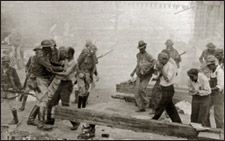 |
| After forcing the veterans out of Washington, MacArthur’s troops crossed the 11th Street bridge and, using gas grenades and wielding bayonets, drove the marchers from their Anacostia camp. (National Archives) |
Events elsewhere help explain Hoover and MacArthur’s state of mind. Students loudly interrupted the general’s commencement address at the University of Pittsburgh that summer as he spoke against demonstrators protesting the government. More alarming, a union-inspired hunger march at a Detroit auto plant that spring had turned ugly. Police killed four civilians while trying to maintain control, injuring 60 others. Communist Party leaders retaliated, organizing a 6,000-man funeral procession, waving red banners and marching in cadence to the party’s anthem, the ‘Internationale.’ Fearing a similar or worse result in Washington, Hoover and MacArthur acted with dispatch when confronted by a large group of disgruntled citizens. Throughout their lives, both officials clung stubbornly to the claim that subversive elements bent on destroying capitalism were behind the veterans. Neither man ever accepted the Bonus Army as primarily a group of destitute, desperate, hungry men trying to support their families.
The day’s toll was three dead, 54 injured and 135 arrests. In the rush to point fingers, in addition to the Communist element, Congressman Patman and colleagues received their share of the blame. The Chicago Tribune editorialized that responsibility for the incident ‘lies chiefly at the door of men in public life who have encouraged the making of unreasonable demands by ex-service men and inflamed their mistaken sense of judgment.’ But Alabama Senator and future Supreme Court Justice Hugo Black directed his venom at a different target.
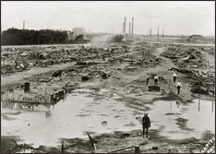 |
| The U.S. Army torched the camp to ensure that the marchers would not return. What had once been an orderly if ramshackle camp was left a devastated smoldering ruin. (National Archives) |
Arguing that Hoover had overreacted to the situation, Black said, ‘As one citizen, I want to make my public protest against this militaristic way of handling a condition which has been brought about by wide-spread unemployment and hunger.’ The New York Times hinted that other senators felt the same. Indeed, it was a common charge hurled by the opposition party during that fall’s presidential election. Senator Hiram Johnson, speaking in Chicago a few days before the presidential vote, dubbed the incident ‘one of the blackest pages in our history.’ Hoping to evoke feelings of sympathy and patriotism, he continued, noting that the displaced veterans had been hailed as heroes and saviors only a decade earlier: ‘The president sent against these men, emaciated from hunger, scantily clad, unarmed, the troops of the United States army. Tanks, tear-bombs, all of the weapons of modern warfare were directed against those who had borne the arms of the republic.’
The public soon followed Black’s lead. Frustrated by Depression-era economics and in tune with Franklin D. Roosevelt’s comparatively more aggressive assistance programs after he assumed the presidency, the public increasingly questioned the government’s response to the plight of the Bonus Army. Many came to see it as callous and heavy-handed. Theater audiences reacted to Bonus Army newsreel footage with choruses of boos.
Ever conscious of his own place in history, MacArthur blinked. At least publicly the general would voice a more sympathetic view of the marchers he once routed. At first he had called them a ‘bad mob,’ but gradually time, or concern over public opinion, softened his expressed view. In his memoirs, MacArthur took credit for supplying the marchers with tents and rolling kitchens, and declared them a ‘vanguard of a starved band,’ remembering the whole affair as a ‘poignant episode.’
If it was a purposeful attempt to improve his image, it failed. His reputation has remained forever scarred. MacArthur biographer William Manchester called his actions that day ‘flagrantly insubordinate’ and ‘indefensible.’ Another historian, echoing Manchester’s sentiment, said the general acted ‘with overzealous determination and reckless impulsiveness.’
Likely influencing the judgment of historians was MacArthur’s demonstrated knack for upsetting his supe-riors. Twenty years after the Bonus Army incident, President Harry Truman would relieve the general of his Korean command for perceived insubordination. In the end, the general’s personality and ambition proved too great an obstacle for history to erase its view of his performance against the Bonus Army.
Along with MacArthur, two other soldiers who participated in the action would go on to write their names large in history — Eisenhower and Patton. Eisenhower would eventually undergo an even more dramatic transformation than his boss in describing the affair. Normally a frank diarist, Ike merely noted at the time that he ‘took part in Bonus Incident of July 28,’ and went on to say, ‘A lot of furor has been stirred up but mostly to make political capital.’ By the time he published At Ease 30 years later, Ike portrayed himself as a frustrated hero of sorts, claiming that he tried to dissuade MacArthur from personally leading the charge. He advised him that Communists held no sway over the marchers, and he reiterated the old claim that his boss ignored White House orders to halt operations. Interestingly, Ike waited until after MacArthur’s death in 1964 to present this version. If it distorted history, MacArthur was not around to contest it.
It was a messy affair for everyone. Patton, a man who revered duty, had mixed emotions, calling it a ‘most distasteful form of service.’ Within months he criticized the Army’s tactics, believing they violated every precept of how to handle civil unrest. Still, he commended both sides: ‘It speaks volumes for the high character of the men that not a shot was fired. In justice to the marchers, it should be pointed out that had they really wanted to start something, they had a great chance here, but refrained.’ And while Patton was disgusted that ‘Bolsheviks’ were in the mix, he considered most of the Bonus Army ‘poor, ignorant men, without hope, and without really evil intent.’ To his dismay, the routed marchers included Joseph Angelo, who 14 years earlier had saved the wounded Patton’s life by pulling him to safety from a foxhole.
The episode would dog President Hoover in his attempt to win a second term of office in the fall of 1932. Presidents had called out federal troops before to suppress civil unrest, but this was the first time they had moved against veterans. It left a bad taste in the mouths of voters. A letter to the Washington Daily News expressed the sentiments of many. ‘I voted for Herbert Hoover in 1928,’ one disgusted woman wrote. ‘God forgive me and keep me alive at least till the polls open next November!’
Hoover’s Democratic challenger in that fall’s presidential election, Franklin D. Roosevelt, understood the political significance of the president’s use of force. Like his opponent, the New York governor did not support payment of the bonus, but he found Hoover’s tactics appalling. ‘He should have invited a delegation into the White House for coffee and sandwiches,’ Roosevelt told one aide as he perused the morning papers. Already confident of success, Roosevelt now felt victory was certain. This was a black eye no one could overcome. Roosevelt won decisively, capturing 42 states with 472 electoral votes compared to just 59 for his Republican rival.
Hoover had no illusions, but he could not help but feel bitter. Stopping just short of calling Roosevelt a liar, the former president later wrote of the campaign: ‘This whole Democratic performance was far below the level of any previous campaign in modern times. My defeat would no doubt have taken place anyway. But it might have taken place without such defilement of American life.’ The vision of Regular Army troops marching on veterans would provide propaganda for the Left for years to come.
Long before that, the remnants of the Bonus Army drifted home, stopping for a brief period in Johnson, Pa., until that community too urged them on. The government buried the two Bonus Army veterans slain by police at Arlington National Cemetery with full military honors. One year later, another contingent of veterans came to Washington to press the issue of the bonus payment. The new president was no more receptive than the last, but instead of the Army he sent his wife, Eleanor, to speak with the former servicemen. More important, he created the Civilian Conservation Corps, which offered the men employment. And three years later, Congress passed legislation over FDR’s veto to complete the bonus payment, resolving one of the more disturbing issues in American politics.
This article was written by Wyatt Kingseed and originally published in June 2004 issue of American History Magazine.
For more great articles, subscribe to American History magazine today!





